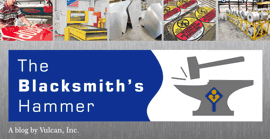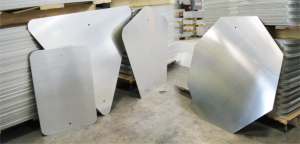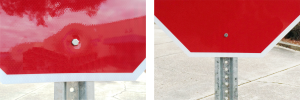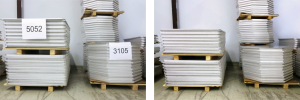Lately, the buzz in highway industry news has been centered on Alloy Substitution. 5052 alloy vs 3000 series alloys… what is the difference and why should you care?
At Vulcan, the highway industry is a major market that we manufacture sign blanks and finished signs for. 5052-H38 has been the highway industry standard alloy specified by all DOTs for over 40 years, and for good reason…
– Vulcan 5052 has 39.3% more Tensile strength and 33.3% more Yield strength than 3105*. This is critical to the performance of the sign in the field. A stronger sign resists vandalism along with providing greater wind load.
The lower Tensile strength found in 3105 also results in installation holes wearing out more quickly (as seen in the photo above on the left.) The 5052 alloy stop sign shown (in the photo above on the right) proves what a difference Tensile strength can make in the longevity of the sign.
– Vulcan 5052 has 5 times the magnesium content of 3105, giving it vastly superior corrosion resistance*
– Vulcan 5052 is manufactured using prime aluminum ingot, while it is common practice for 3000 series to be produced from scrap material
– Relative to the performance of the two alloys, the price difference is negligible
– Stocking only Vulcan 5052 alloy will simplify managing dual inventories, providing confidence that the alloy will stand up not only to DOT testing, but also harsh outdoor elements.
Vulcan specializes in the manufacture and fabrication of 5052-H38. Its long-standing reputation as the industry standard speaks for itself.
*Data from 2009 Aluminum Standards and Data issued by The Aluminum Association
 Vulcan Corporate
Vulcan Corporate
 Sheets, Blanks & Extrusions
Sheets, Blanks & Extrusions
 Custom Stamping & Laser Cutting
Custom Stamping & Laser Cutting
 Traffic Control & Commercial Signage
Traffic Control & Commercial Signage
 Aluminum Coil in Multiple Tempers, Gauges & Widths
Aluminum Coil in Multiple Tempers, Gauges & Widths
 Utility Signs, Markers & Related Products
Utility Signs, Markers & Related Products









